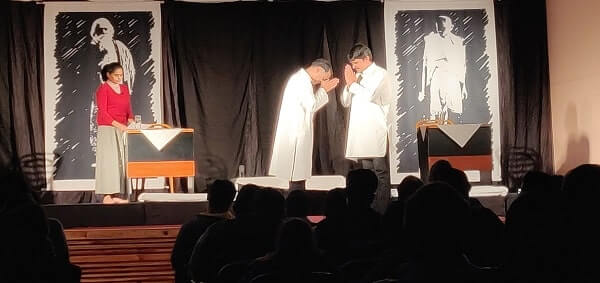Gandhi and Tagore
And so it came as a bit of a surprise to learn that they rarely agreed on anything.
A recent theatre production brought to life the strange relationship between the two men, fraught with disagreements but nurtured with much mutual respect.
The Bangalore Little Theatre (BLT) was in Sydney last week to stage a play called The Prophet and the Poet at the Parramatta South

In the 90-minute staging, it is the conversations between the two men that takes centre stage, rather than portrayals of the protagonists themselves. Even the sets were minimal, emphasising only on the intriguing exchanges that took place between 1915 and 1941.
The two men, both fascinating personalities, disagreed on everything that they
The play got off the mark with slideshows of original letters written by the two men. In these long-winded notes, they debated various political issues on which they professed differing standpoints: on Hindi as national language (a debate that continues nearly a century later!); Tagore’s criticism about Gandhi’s non-cooperation movement, Swaraj and Gandhi’s absence at the Round Table Conference; Gandhi’s visit to Shantiniketan; Tagore’s concern on Gandhi’s frequent fasting.
Their last letters in 1940 were particularly interesting.
While actor Minti Jain narrated the play, actors Naveen Tater and Karan Singh discussed the letters of Gandhi and Tagore. These three actors of Bangalore Little Theatre could win any international memory competition – effortlessly delivering innumerable pages of intricate dialogue, stunning with their extraordinary memory power. They later admitted to hours of rigorous practice!

Bangalore Little Theatre is one of India’s oldest theatre groups, which has produced over 200 plays in 50 years. It is known for its creative and quality productions, training workshops and outreach programs.
About The Prophet and the Poet, actor Naveen Tater told Indian Link, “This play has been performed 106 times.”
He revealed that having worked in this thought-provoking play has been a great learning experience for him personally.
“The actual correspondence in the letters is interspersed with imaginary dialogues but based on historic details,” he described. “These are not full letters. These are just excerpts of the actual letters. Actually they wrote long letters to each other, both being voracious writers. Their language was such that we had to relearn a lot of English! There were so many words we don’t use today, so much of grammar we don’t utilise. It is a grammar that’s forgotten. We had to learn enunciations for this play. A lot of our own language went through development when we rehearsed for this.”
The learning had not been restricted to language alone, Naveen offered. “You know, every staging of this play is different – we end up discovering something new! Perhaps this is what they intended. After every performance, we learn new things and we keep revising the content.”
Though the play is set in the pre-independence era, the messages that the leaders conveyed via their letters are relevant even now.
“They would probably be relevant 500 years from now,” Naveen laughed. “The crux of the whole thing that these two contemporary leaders shared, would be the same. That is their greatness. They were not born great, as they had their own share of struggles. What is interesting is that they do not agree with each other on almost anything except for the fact that India needs independence. Despite the dissent, they have love and respect for each other and that’s a very delicate balance which today the world has lost. That is the message that this play brings. Dissent can sometimes be an engine for growth. You can only thrive with dissent. If you suppress dissent, then there is no thriving.”
A great message for today’s highly polarised world.
For me personally, the play was revealing in many ways. So far, I’ve known Gandhi through his books. But here in this play, I was seeing another Gandhi: a Gandhi through the eyes of a peer, an opponent, a true friend – Tagore.
It was Tagore, laying bare before us, a Gandhi we could never have known.




